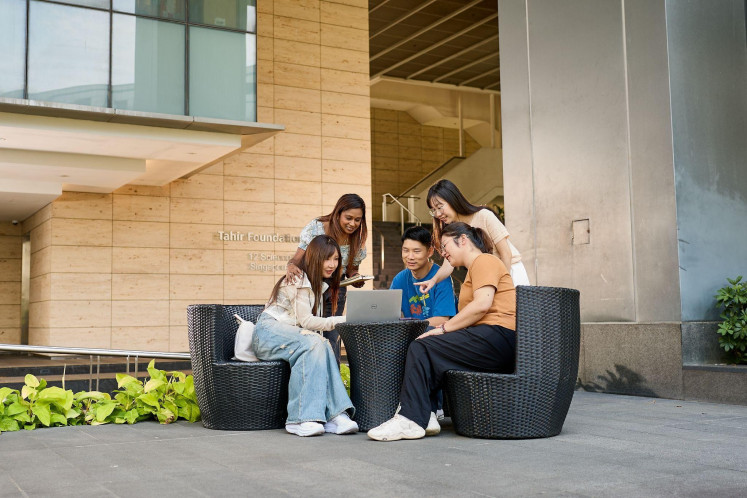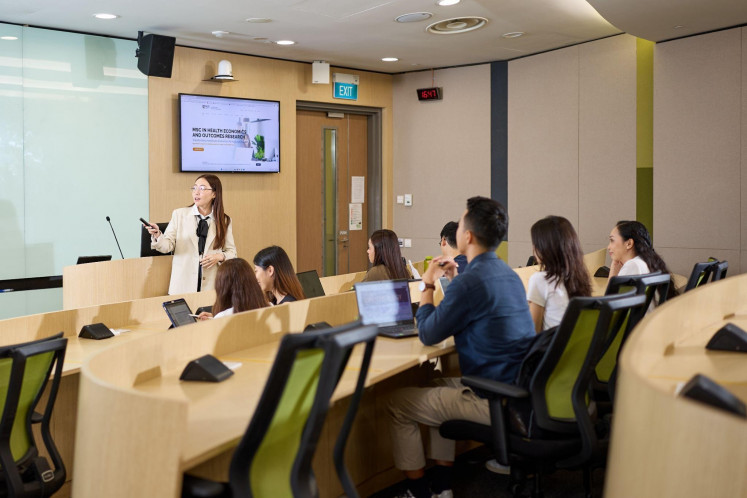Popular Reads
Top Results
Can't find what you're looking for?
View all search resultsPopular Reads
Top Results
Can't find what you're looking for?
View all search resultsShaping future health leaders: inside NUS’s career-ready public health master’s programs
As global health systems adapt to shifting demographics, rising costs and the lasting impacts of COVID-19, the demand for professionals who can navigate both policy and practice has never been clearer. At the National University of Singapore (NUS), two graduate programs, one long-established and one brand new, are preparing students to meet that demand head-on.
Change text size
Gift Premium Articles
to Anyone
O
ffered by the Saw Swee Hock School of Public Health, the Master of Public Health (MPH) and the upcoming MSc in Health Economics and Outcomes Research (HEOR) reflect NUS’s commitment to global relevance, academic rigor and industry-aligned training.
Meeting the region’s public health priorities
First launched in 2007, the MPH program is one of Asia’s most established pathways into public health leadership. Its focus is regional, but its standards are global. It combines foundational knowledge with applied skills across areas such as epidemiology, biostatistics, policy development and more.
“Compared to programs that focus narrowly on one area, the MPH is broader by design,” said associate professor Mary Chong. “We emphasize integration and systems thinking so that graduates are equipped to lead across sectors. But there’s also room to specialize and go deep into specific domains when needed.”
Mary also highlighted the value of NUS’s strong regional and global networks. “NUS’ global rankings, world-class faculty, and robust research infrastructure give students access to an academic ecosystem that is both deep and wide,” she said.
“This exposure to regional and international collaborations helps cultivate public health leaders who are adaptable, thoughtful and equipped to drive meaningful change in public health.”
Furthermore, the requirement of one to two years’ work experience ensures that students bring practical insights into the classroom, enriching discussions and group learning throughout the program.
At the heart of the MPH is an eight-week practicum that gives students the chance to apply their learning to real-world public health challenges. They identify a topic aligned with their interests, from mental health in the elderly to youth vaping and work under the guidance of a faculty supervisor.
“The practicum strengthens their ability to communicate public health findings both orally and in writing, which is especially important when they’re acting as a bridge between policymakers and the public,” said Mary. One recent project involved analyzing Singapore’s Nutri-Grade labelling system for sugar-sweetened beverages, showing how students tackle issues directly relevant to policy and practice.
Collaborative by nature. Students are encouraged to further their discussions outside the classroom to build peer learning and perspectiveOver the years, graduates have gone on to work in a wide range of settings, from government agencies and NGOs to academia and multilateral organizations like WHO, UNICEF and the World Bank, said Mary.
Health economics: a new, in-demand offering
Launching in August 2026, the MSc in Health Economics and Outcomes Research (HEOR) is NUS’s latest response to growing demand for professionals who can evaluate healthcare interventions not just for effectiveness, but for impact and value. From budgeting to policy, it addresses the economic questions that shape real-world decisions in healthcare.
“The question isn’t only ‘does a treatment work,’ but also ‘how well does it work,’ ‘how much does it cost,’ and ‘is it worth it?’” said associate professor Alec Morton, the program director. “Those are critical considerations when deciding how to allocate healthcare resources.”
Although new, the HEOR program draws on NUS’s established expertise in Health Technology Assessment, previously offered as a specialization in the Master of Public Health (MPH).
“We’ve had a strong teaching and research track record in this area for several years,” Morton shared. “This program builds on that, but offers students a more focused and immersive experience.”
The curriculum brings together economics, modelling, health policy and statistics, and is open to students from a range of academic backgrounds including science, economics engineering, and policy. “We want people who are comfortable with data and numbers, but who are also motivated by making a difference in the real world,” Morton said.
Beyond core modules, students will apply their knowledge in team-based projects and a capstone project, where they explore real healthcare questions. This practical emphasis is designed to support a range of future roles, from pharmaceutical reimbursement and policy evaluation, to health systems strategy and analytics.
Examples include work with Illumina on how Asian countries regulate and fund genetic testing, and with Roche on the clinical and economic impact of new drugs, which include how they help patients and caregivers stay productive longer.
Students engaging in immersive, seminar-style learningThe HEOR program is designed not just to develop technical skills, but to prepare students to contribute meaningfully to how healthcare systems allocate resources and assess value, with real-world decision-making in mind.
A global degree with regional relevance
Both programs underscore NUS’s position as a global leader in education, while remaining deeply attuned to the health challenges facing Asia.
From real-world practicums to reliable, tested frameworks, the degrees reflect a shared goal: to equip future professionals not just with knowledge, but with the ability to make meaningful change in their systems, institutions and communities.
Whether you’re coming from economics, health sciences, or policy, these programs give potential students the tools to ask better questions, and to lead conversations that matter.
Ready to advance your impact in public health? Find out more about the programs here.










